“Cleanliness is next to godliness,” they say, but what if you’re in a pinch and your dish soap is nowhere to be found? In this case, can you use clothes detergent to wash dishes?
Have you been in this dilemma before? If so, you are not alone for sure. Recently, I thought the same way and well-researched regarding this.
While it might seem like a quick fix, using clothes detergent to wash dishes isn’t the wisest choice. But why?!
For this, let’s delve deep into the insights and learn why clothes detergent should stay in the laundry room but not in the kitchen!
Understanding the Composition of Clothes Detergent
Understanding the composition of clothes detergent permits you to use it more perfectly and make familiar alternatives.
Here’s a breakdown of its key components:

1. Surfactants
Surfactants present in clothes detergent remove dust, oil, and stains from clothes. They are crucial for breaking oil and dirt.
2. Enzymes
Enzymes are focused on unique kinds of stains. They help in removing stains like blood, egg spills, starches, and oils.
3. Builders
Builders beautify the effectiveness of surfactants by softening the water, helping to prevent soap scum, and enhancing the detergent’s capacity to clean.
4. Solvents
Solvents consist of alcohols or other chemical compounds that assist in dissolving or eliminating oil residues and help in rinsing away the hard stains from clothes.
5. Fragrances
Fragrances included are not used for cleaning but are necessary to provide a pleasant scent and they assist in removing odors and leaving garments smelling fresh.
6. Dyes
Dyes are used for product branding as they are not effective in cleaning but they are used to provide detergent colour to make it visually unique and attractive.
7. Optical Brighteners
Optical brighteners help to make clothes whiter and brighter. They do not clean clothes but enhance their look by shine.
8. Preservatives
Preservatives hold the damages and increase product life over the years. They are used to save from micro-organisms, mold, and mildew in the detergent.
9. Anti-Foaming Agents
Anti-foaming agents are used to control the quantity of foam produced while washing as excessive foam can affect washing efficiency and cause issues in washing machines.
10. PH Adjusters
pH adjusters are chemical substances that help keep the detergent’s pH level. Proper PH levels ensure that the detergent works successfully without damaging fabric.
Suggested Read: How To Get Blood Out Of Sheets: 15 Special Secrets Unveiled!
can you use clothes detergent to wash dishes: 5 Potential Risks
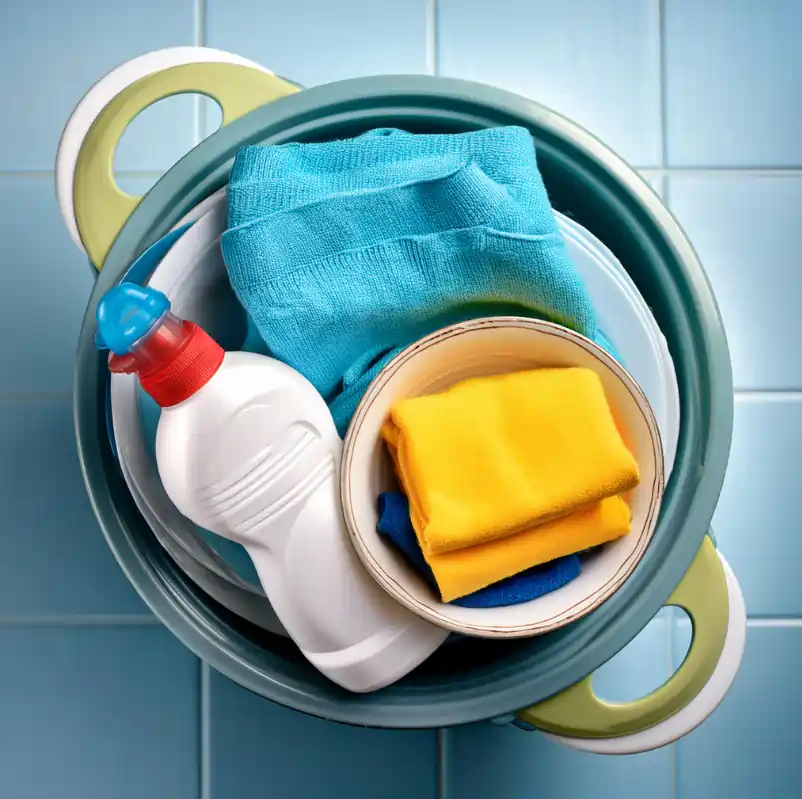
If you’ve ever run out of dish soap and thought of using clothes detergent alternatively to wash dishes? You might need to rethink.
While it might seem like a quick trick using clothes detergent for dishes can include numerous dangers.
Let’s discover why this swap won’t be recommended.
1. Damage to Dishware
Clothes detergent contain harsh chemicals that are not suggested for washing dishes as they can damage delicate dishware.
Over time, those chemical substances may cause discoloration specifically if they are non-stick. This can shorten the lifespan of your dishware.
2. Allergic Reactions
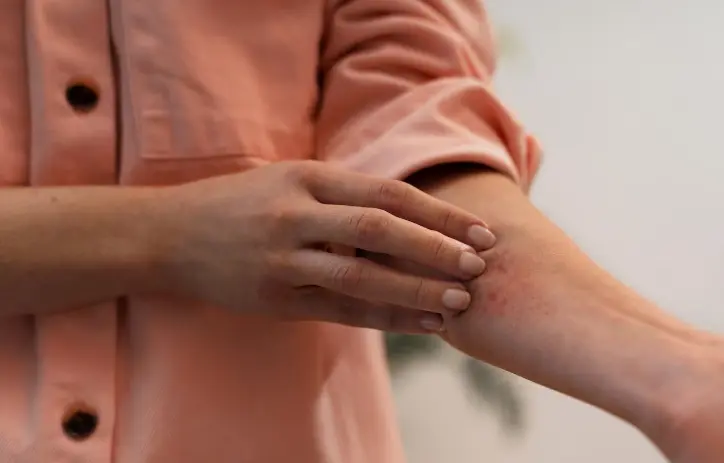
Fragrances and components in laundry detergent can cause allergies and skin irritations if they come into contact with food.
These reactions can affect all who use those dishes or come into contact with the detergent residues.
3. Excessive Foam Formation
Clothes detergent produces more foam than dish cleaning soap and it is not good to wash dishes as it may cause overflow and a mess on your sink.
The excessive foam can also make it difficult to rinse dishes well, leaving residue back and this can bring incomplete cleaning of dishes.
4. Ineffective Stain Removal
Laundry detergents are designed to clear stains on clothes but not to remove food stains so they will not effectively get rid of meal residues.
This can result in dishes that aren’t as clean as they ought to be, requiring extra effort to acquire the preferred cleanliness.
5. Risk to Children
If dishes are washed with laundry detergent and are used by children, there’s a high risk of ingesting dangerous chemical substances.
This can be especially risky due to their small level of immunity and a higher level of susceptibility to toxins.
Suggested Read: How To Remove Water Stains From Marble: 12 Brilliant Tricks!
Difference between dish soap and laundry detergent
When it involves cleaning, dish soap and laundry detergent serve similar functions.
Dish soap is mainly for cleaning residues on dishes, while laundry detergent is designed to address many stains and odors on clothes.
Understanding their differences assists you in using every product correctly for its supposed job.
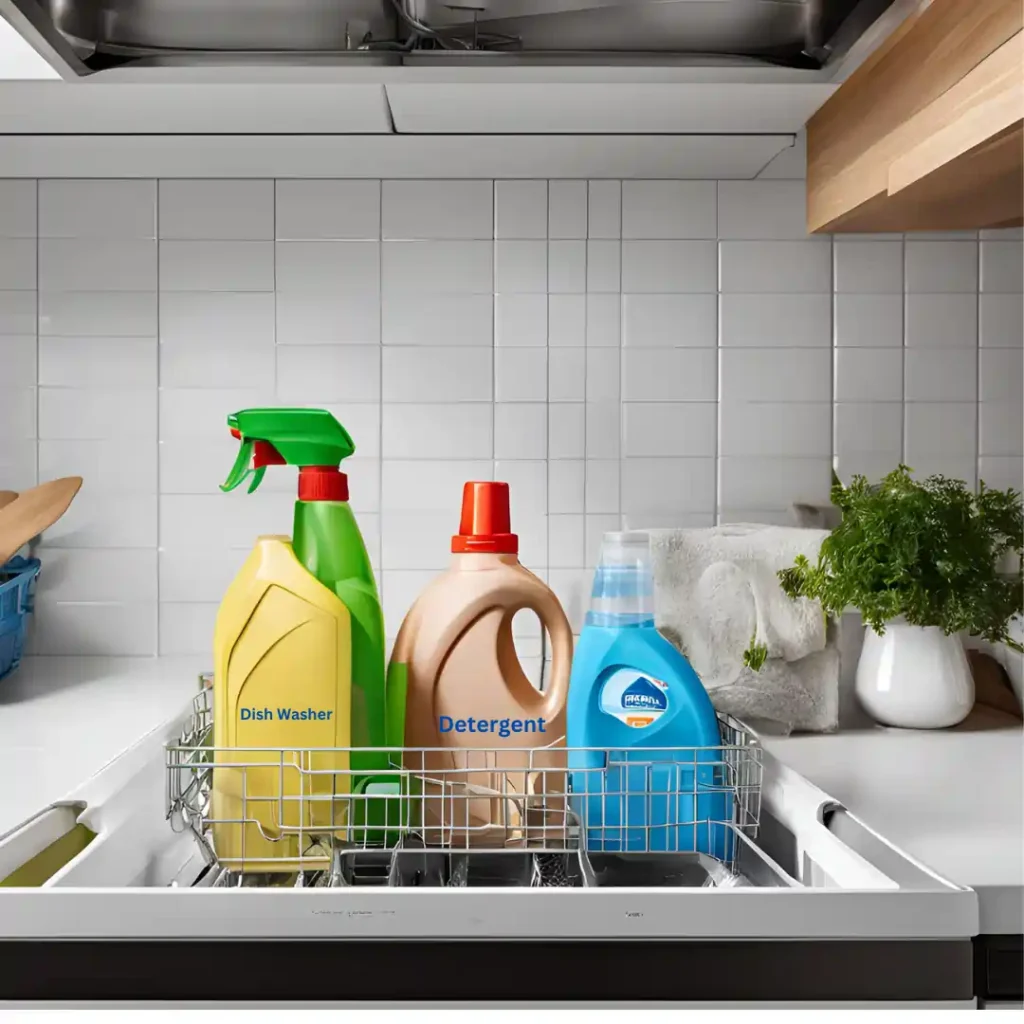
What’s In Dish Soap?
- Surfactants: They tend to be primary cleaning agents that spread and lift away oil and grime from dishes.
- Builders: Builders progress the effectiveness of surfactants by softening water, preventing soap scum, and improving cleaning power.
- Solvents: These are chemicals such as alcohol, that help dissolve and remove stubborn oil and food residues.
- Fragrances: Added to provide a pleasant scent and remove residual odors.
- Colorants: Give the soap a unique appearance, making it visually attractive.
- Preservatives: Prevent the growth of bacteria and mold, ensuring the soap remains effective and safe to use over time.
What’s In Laundry Detergent?
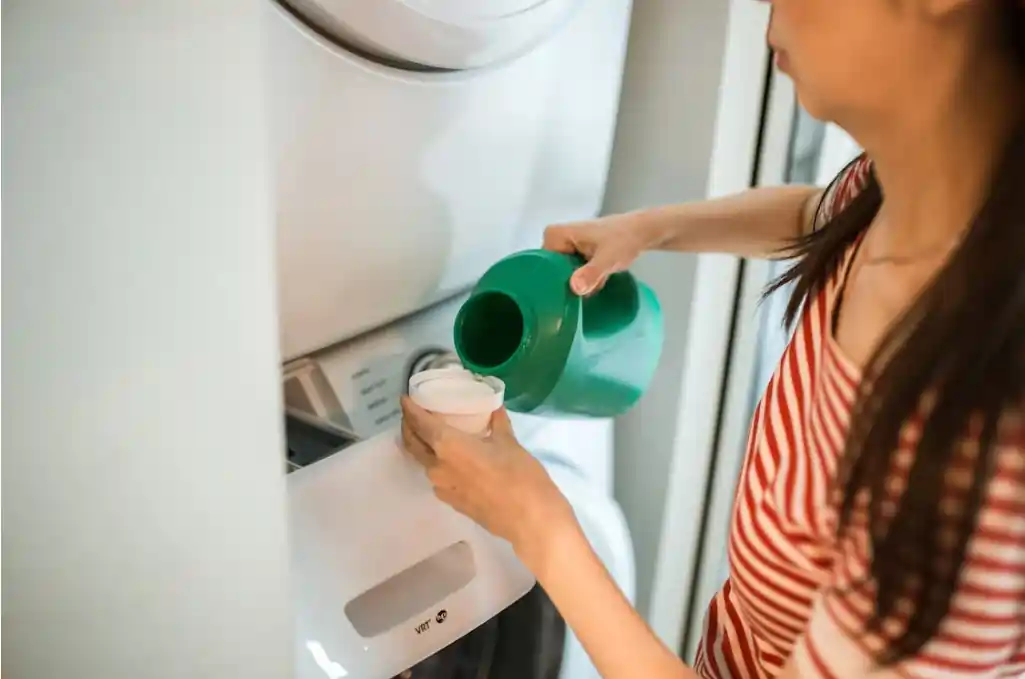
- Surfactants: They will break down and lift stains and dirt from fabrics or hard clothes.
- Enzymes: Enzymes specifically target specific types of stains, such as blood or starches from food, for thorough cleaning.
- Builders: Enhance the performance of surfactants by softening water and binding minerals, preventing residue build-up.
- Fragrances: Add a pleasant scent to your laundry.
- Dyes: Give the detergent a distinctive color.
- Optical Brighteners: Reflect light to make fabrics appear whiter and brighter.
Suggested Read: How to Remove Stubborn Stains from Clothes: 5 Laundry Hacks That Really Work.
Steps for Washing Dishes Without Dish Soap: 4 Simple Steps
Are you thinking about washing dishes without dish soap and need a short alternative?
Don’t worry—there are simple techniques to get your dishes sparkling easily.
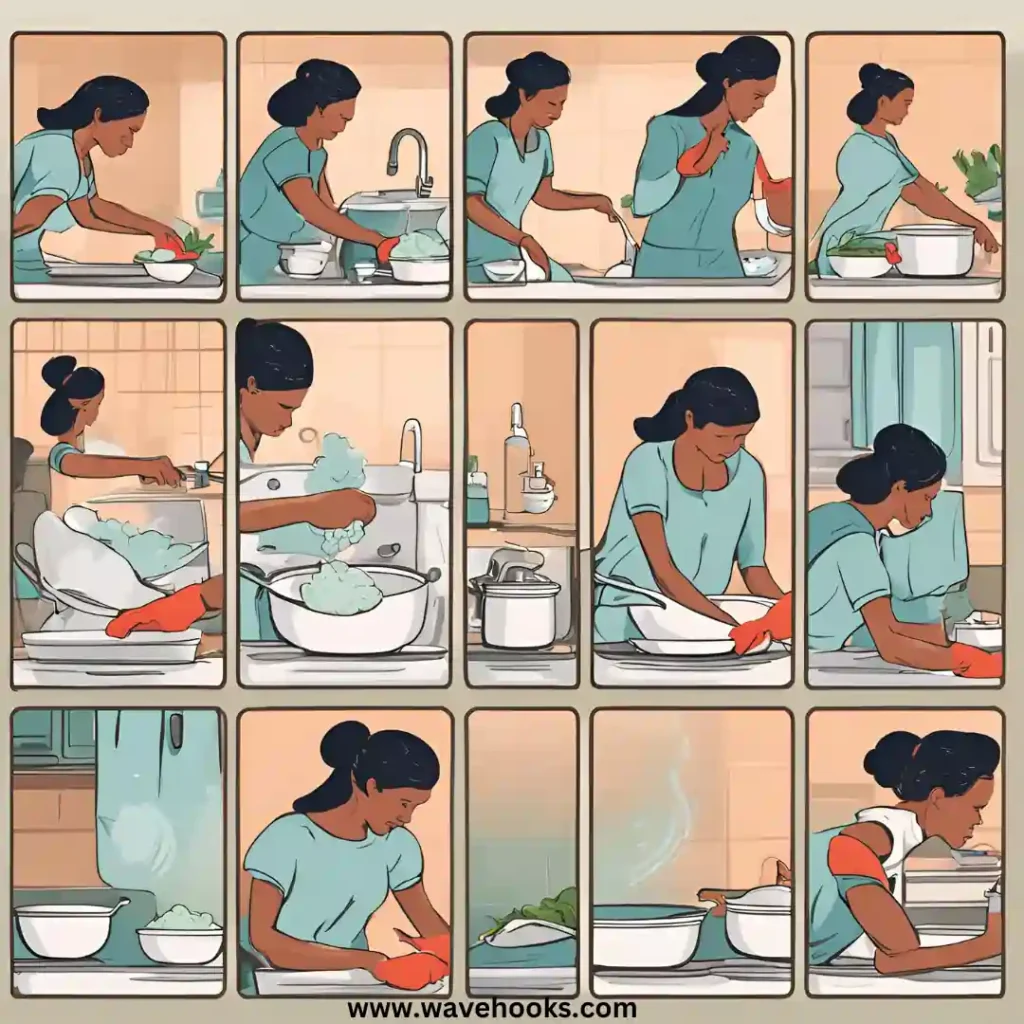
1. Rinse Thoroughly
Begin by rinsing the dishes with warm water to remove food debris and oil. Hot water helps to dissolve drying and sticking residues effectively.
Ensure to rinse each corner and edge thoroughly. This step clears and prepares the dishes for deeper cleaning and reduces the dust left on them.
2. Use Baking Soda
Baking soda acts powerfully in cleaning oil and meal residues without scratching the surfaces. It removes odors easily from dishes.
Sprinkle baking soda on damp dishes and use a sponge or brush to scrub on cussed stains or residues and rinse it thoroughly to get rid of baking soda residue.
3. Add Vinegar
Vinegar is used as a natural disinfectant to remove food residue easily.
Prepare a solution using water and white vinegar in equal parts and use it to rinse the dishes.
Pour the vinegar over the dishes and rinse the dishes again with warm water.
It also assists in reducing lingering odors and leaves dishes glowing easily.
4. Dry Properly
After rinsing the dishes allow them to air dry on a clean rack. Ensure to completely dry to avoid water spots and residues.
Air drying allows to prevent the increase of bacteria and mildew that could thrive in damp environments.
Suggested Read: How To Make Your Bathroom Smell Like A Spa: 20+ ‘Scent’-Sational Ways
What can I use to wash dishes instead of dish soap
If you’ve run out of dish-cleaning soap and need a short alternative, there are numerous household things you can use to get your dishes clean.
These alternatives are powerful substitutes that allow you to address the dirty dishes.
1. Lemon Juice
Lemon juice has an antibacterial quality and citric acid which allows it to break down tough residues.
Mix with water for a powerful cleaning solution. It also acts as a natural disinfectant, making it appropriate for cleaning dishes.
2. Salt As Alternative
Salt has moderate antibacterial properties which could assist in disinfecting.
Its texture can help in removing stubborn residues without scratching.
Use salt as a pre-wash scrub or combine it with lemon juice or vinegar for an effective cleaning combination.
It is a natural abrasive that allows for scrubbing food particles.
3. Cornstarch
Cornstarch is used to absorb oil and it is safe for delicate dishes.
Sprinkle it on dishes before washing to lift off sticky residues.
Mix cornstarch with water to create a paste for more powerful scrubbing.
It is particularly useful for cleaning pots and pans with cussed and sticky food stains.
4. Tea Bags
Brewed tea, especially black tea helps to remove oil.
It is gentle and the antioxidants present will assist with minor antibacterial wants.
Use tea to rinse dishes or soak them as tea can help to avoid residues.
Then you can add a mild, natural perfume that may be used regularly as part of a cleaning.
5. Milk As Natural Ingredient
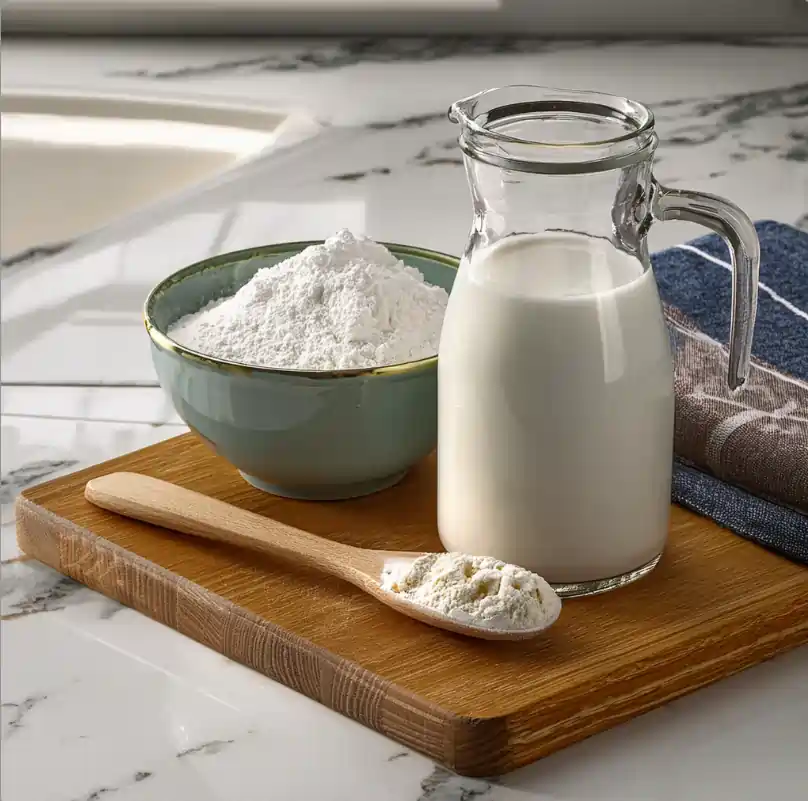
The fat in milk can break down oils and residues. This is also a powerful natural ingredient in oil pots and pans.
Use it to soak dishes before washing to make cleaning simpler.
It also assists with cussed stains on dishware. For better results after soaking wash dishes with hot water.
Suggested Read: Why Does My Bathroom Smell Like Sewer: 14 Easy Fixes!
Can I use shampoo to wash dishes?
Shampoo is designed for hair and it won’t correctly reduce residues on dishes also it is not suggested for cleaning.
While it is easy to use to some extent but not utilized for food safety and residues can cause dangerous problems.
Can I use coconut oil to wash dishes?
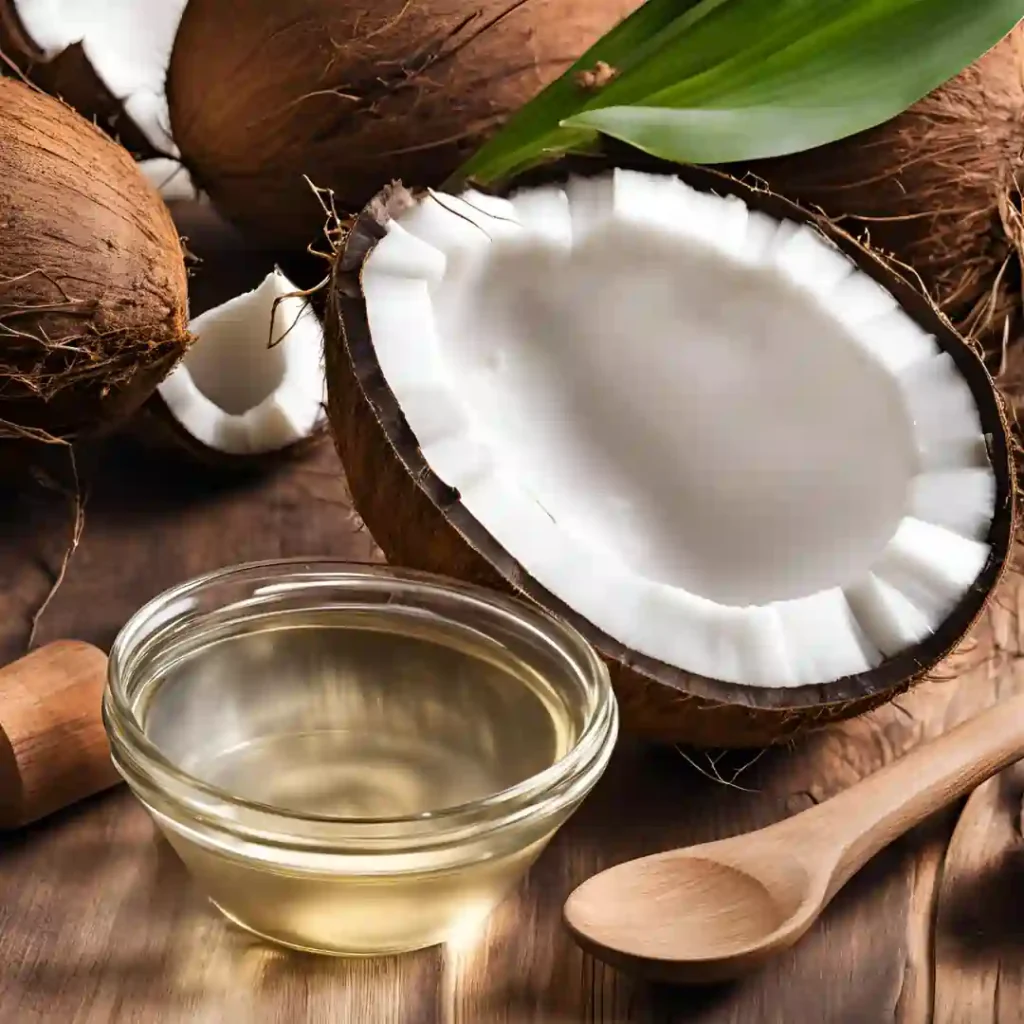
Coconut oil can help with stubborn residues that exist on edges or corners.
However, it is not used as a complete cleansing solution for washing dishes.
It may leave an oily residue and isn’t powerful for removing all types of food residues or cleaning dishes.
Can I use shaving cream to clean dishes?
Shaving cream is designed to provide a lather for shaving, but it is not recommended for cleaning dishes.
Even though it creates foam it is not useful for easing oil or putting off meal residues.
This is also not safe for health if they come in contact with food.
Can I use toothpaste to wash dishes?
Toothpaste contains chemical substances designed for dental hygiene, not for cleaning dishes.
It can also clean to a point, however, it’s no longer suitable for disposing of oil or cleaning dishes.
This might also leave residues that are not safe for ingestion.
FAQS: Can You Use Clothes Detergent To Wash Dishes?
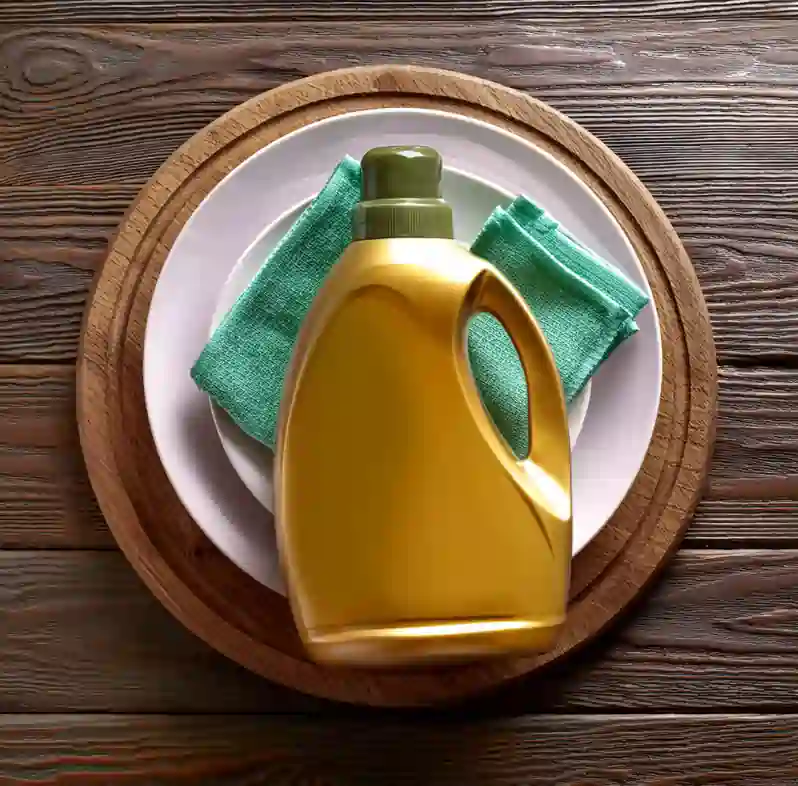
1. What If I Accidentally put laundry detergent in dishwasher?
If you accidentally place laundry detergent inside the dishwasher, it may cause excessive foam and damage. Run the dishwasher on a rinse cycle without any dishes to clean out the detergent and save you overflow.
2. Can I use body wash to wash dishes?
Body wash is not recommended for cleaning dishes as it consists of moisturizers and fragrances aren’t food-secure and dangerous to health. For proper cleaning and safety use dish soap to get rid of oil and meal residues correctly.
3. safe alternatives to laundry detergent?
Safe alternatives to laundry detergent are baking soda for odor removal, white vinegar as a fabric softener, and castile soap for gentle cleaning. Soap nuts and reusable laundry balls are also powerful and eco-friendly options.
4. Can I use body wash as dish soap?
No, body wash must not be used as dish soap. It is prepared for the skin, can leave residues harmful to health, and lacks the oil-removing capacity like dish soap. For safe and powerful dishwashing use products usually designed for cleaning dishes.

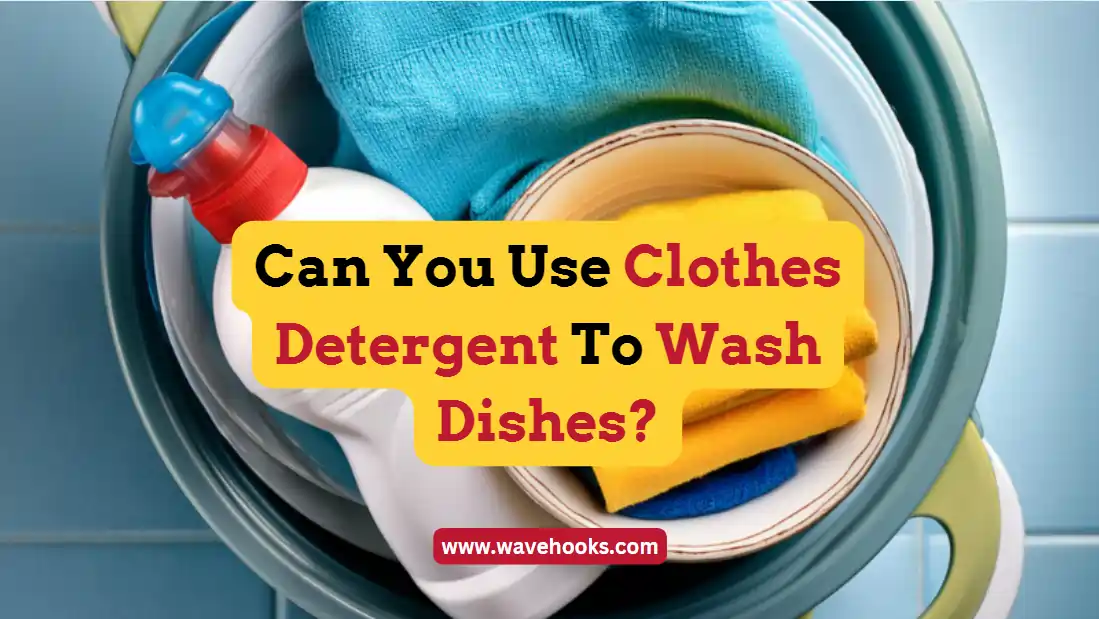
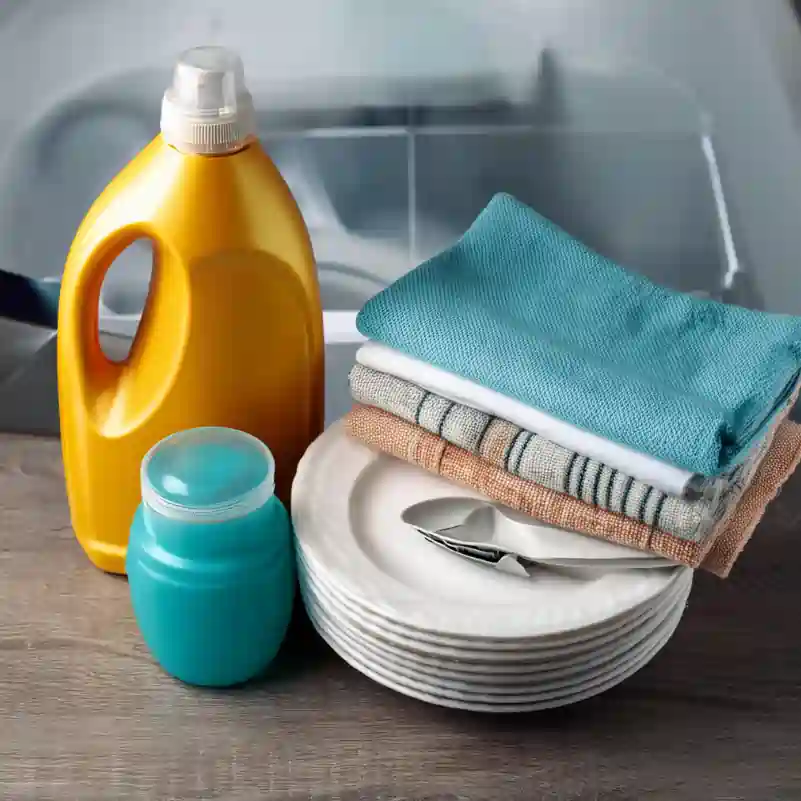


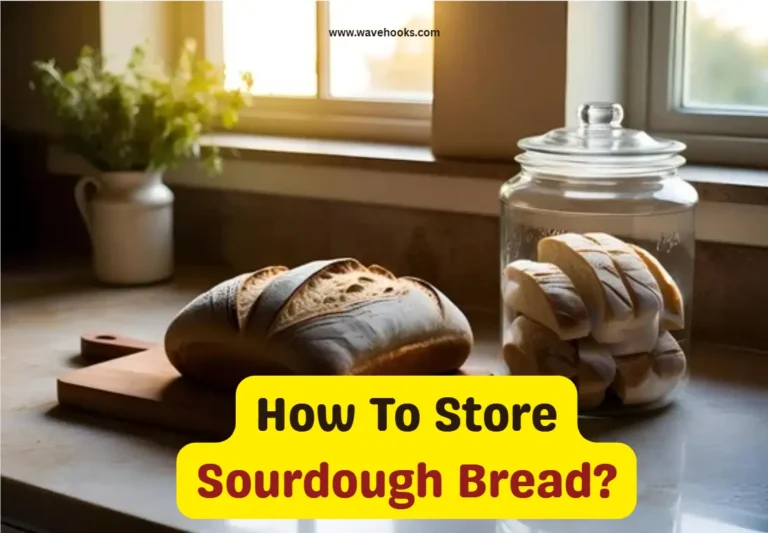



One Comment